By John Helmer, Moscow
Radosław Sikorski (lead image, left), the ex-foreign minister of Poland, ousted Speaker of the Polish Sejm (parliament), and premature retiree from the Bydgoszcz constituency, doesn’t speak his mind so much as his interest. So why has he announced he is now in favour of leaving Crimea in Russia; a separate peace with the Kremlin for the Lugansk and Donetsk regions in eastern Ukraine, and a strategy for the government in Kiev to “concentrate on creating success for the 90 percent of the country’s territory which it controls”?
Sikorski has also publicly broken with Ukrainian President Petro Poroshenko, who has been employing Sikorski as a foreign advisor, by declaring the Ukrainian president must make his own business dealings less illegal. “The fight against corruption must come from the top,” Sikorski has said of Poroshenko. “The people in the top layer must show that their finances are in order, they are open to scrutiny and lead by example.”
Leading by example, Sikorski has acknowledged, can cost politicians their jobs. When Sikorski was in power, receiving state expense-account eats and drinks, he was privately hostile to those whom, in public, Sikorski appeared to be supporting. The record of the clandestine Warsaw restaurant tapes of Sikorski’s table talk reveal his eagerness to serve a local oligarch’s profit by banning imports of Russian coal. The tapes also exposed Sikorski’s expletive rancour against US President Barack Obama and British Prime Minister David Cameron for refusing to back his promotion to be NATO Secretary-General, then European Union foreign affairs commissioner. For the full story of Sikorski’s recriminations, read this and this.
The tapes revealed a politician who changed his policy several times a day, depending on who was paying for lunch. An ongoing investigation by the audit and ethics committee of the Polish parliament is also examining the changeability of Sikorski’s income reports, along with those of his wife, Anne Applebaum. For details, read this.
Nine months ago, in September 2015, Sikorski was pitching himself to President Poroshenko and then-Prime Minister Arseny Yatseniuk, as a new foreign minister for Ukraine.
This too has proved a disappointment to Sikorski.
On May 17 Sikorski opened recriminations against the Ukrainians. According to a verbatim report of remarks he gave to the Stockholm daily, Svenska Dagbladet, Ukraine will be better off without Crimea and the Donbass. “Ukraine has lost a part of its territory – the Crimea and the Donbass. But these are provinces that are unprofitable — Crimea, because so many pensioners live there, and Donbass, because of its lossmaking industries.”
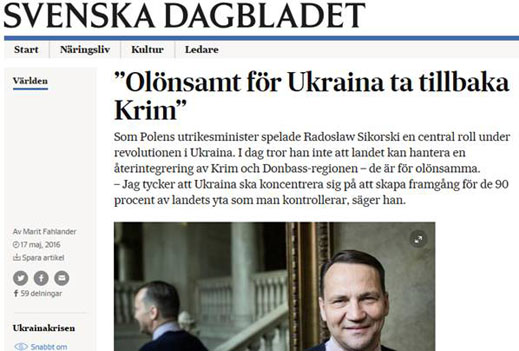
Source: http://www.svd.se/olonsamt-for-ukraina-ta-tillbaka-krim
Sikorski told the Swedes he’s still keen on ex-prime minister Yatseniuk. But now that he’s gone, Sikorski “hope[s] that the new prime minister Volodymyr Groysman [will] be more successful in fighting corruption in the country.” That “task is as important as to guard the border with Russian separatism.” The implication Sikorski left in Stockholm is that he now draws the Ukrainian border to the west of Donetsk city and north of Lugansk. That’s the line defined by the Minsk agreements between Russia, Ukraine, Germany and France on troop and artillery disengagement and buffer zones, according to this British Broadcasting Corporation (BBC) map:
Asked to respond to the evidence from the Panama Papers that President Poroshenko is operating secret businesses outside his country, Sikorski was ironical. “As I understand, the president claims that these legal instruments were used to create a foundation for his personal assets. I await a statement from the foundation.”
Poland’s state radio reacted with criticism from a Polish member of the European Parliament. “It is irresponsible for a Polish Foreign Minister to speak like this,” claimed Zbigniew Kuźmiuk, who has also served two terms in the Polish Parliament in opposition to the governing party when Sikorski was minister. “[Such statements] clearly impinge on the internal issues of Ukraine. I think that Ukraine itself is in a very difficult situation. Russia annexed Crimea. It is also conducting a war on the eastern part of the country, and this kind of statement [by Sikorski] suggests that Ukraine has already lost this land. However, so far, the EU’s position and that of Ukraine’s nearest neighbour, Poland, is currently very strong…Poland and Poles should be happy that for the last half a year, Radosław Sikorski has not been Polish Foreign Minister.”
Sikorski has been in Warsaw in recent days as Polish debate heated up on risks of war with Russia, conflict on the Kaliningrad frontier, and the reliability of the US and European alliances. A summit meeting of NATO will start in the city this Friday.
Last week in Warsaw Sikorski met with former US Secretary of State Condoleezza Rice (lead picture, right) for a public discussion entitled “Saving the West: is Democracy under threat?” In August 2008, Rice (below, left) and Sikorski (right) had signed the US-Polish agreement to install Aegis, the US anti-missile interceptor system aimed at Russia’s nuclear missile sites.
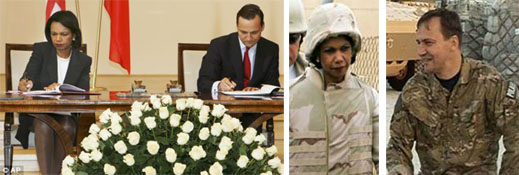
Following their rematch in Warsaw last week, CEPA facebooked its “privilege” and its “thanks”. The think-tank has yet to publish either excerpts or a transcript of what Rice and Sikorski said.
The CEPA twitter feed indicates that Sikorski didn’t repeat his new Ukrainian line, and there were no questions about it from the audience. Instead, Sikorski defended his pre-tapes, pro-Washington line. “Signing missile defence agreement under the Bush administration,” he was quoted as telling the CEPA audience, “was an essential contribution to Atlanticism.” He was then upstaged by Rice, whose remarks fill most of the Twitter feed from CEPA director, Marcin Zaborowski. He doubles as a promoter for the Aegis system builder Raytheon; click for more details. According to Zaborowski’s tweets, Rice said: “democratic institutions should be healthy but none of them should dominate, balance is essential”; and “NATO is not only about security, it’s also about democracy.”
Not a word was mentioned about Ukraine, and the threat of Russia to the east was ignored. Instead, Rice and Sikorski were preoccupied with the threat of British withdrawal from the European Union (EU). “Brexit will have no impact on NATO but it can make Europe more inward looking”, Rice expressed concern. “After Brexit, EU without UK will be a new partner for US”, she reassured. Sikorski had the last word, according to Twitter. “Brexit made Putin the happiest man on the planet.”
Several Polish think-tanks and intelligence agencies in Warsaw have been tasked to find out why Sikorski has gone public with his change of policy on Ukraine. Confidential exchanges among them have reported three suspected reasons, according to Warsaw sources – two personal, one political. Because Sikorski’s future is uncertain, the Polish analysts warn, only time will tell whether reasons of heart or mind, sense or state, will prevail.
The first reason is that Sikorski’s marriage with Applebaum is breaking up. She is a partisan of Hillary Clinton, and is hoping for a post in the new administration as the promoter of war with Russia on all fronts, including the recapture of Crimea and Donbass. “Vladimir Putin has a plan for destroying the West—and it looks a lot like Donald Trump”, tweeted Applebaum, and retweeted Sikorski, though neither of them said it.
The second reason is that Sikorski’s marriage with Applebaum is stronger than ever, and they have agreed to a two-way hedge on the outcome of the US election in November. If Clinton wins, Applebaum takes the prize. If Trump wins, Sikorski gets the call to Washington. To appeal to Trump, Sikorski is offering to sacrifice Crimea and the Donbass.
The Warsaw sources say they believe Rice told Sikorski confidentially last week that her chances of joining the Trump Administration, and Sikorski’s chances of getting a call to Washington, depend on signalling enough of a change of policy abroad so as to impress Trump at home, without frightening his voters. “Bad things can happen when big powers throw their weight around,” Rice trumped aloud, during the CEPA discussion with Sikorski. She added in a presidential selfie: “whoever wins American elections would find very quickly how constrained the authorities of this office are.”
Rice has also issued an announcement through a spokesman that she is not running for Trump’s nomination to be vice-president. Rice and Sikorski reportedly agreed in Warsaw they aren’t ruling anything out come November – except 10 percent of Ukraine.

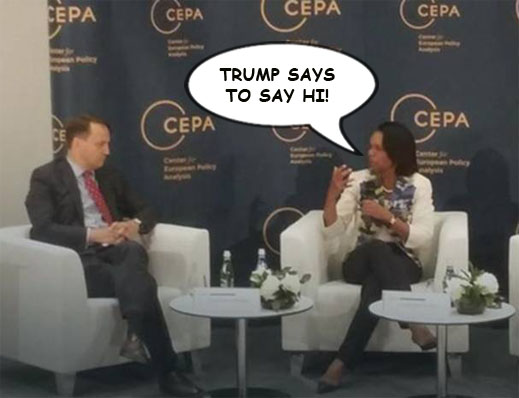
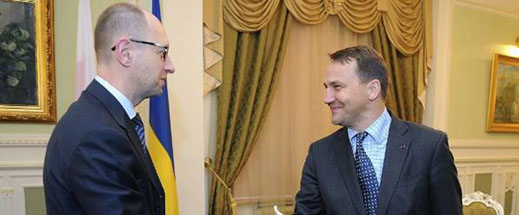
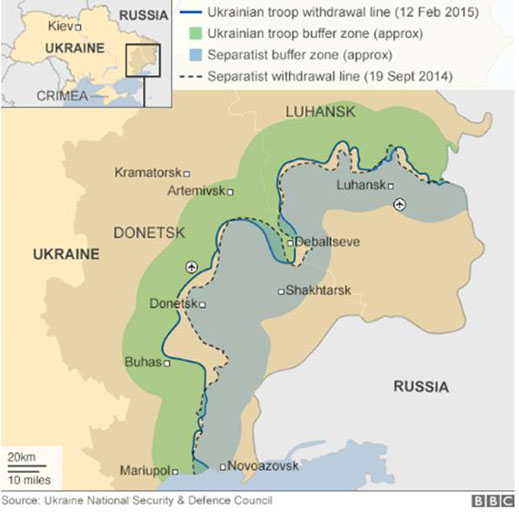











Leave a Reply